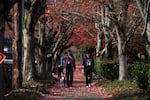
FILE - Pedestrians walk on a sidewalk in Southwest Portland in 2019. Portland City Council tentatively approved a plan Wednesday to spur sidewalk construction and maintenance in Portland’s east and southwest neighborhoods, where many streets are without sidewalks.
Jonathan Levinson
The Portland City Council adopted a plan Wednesday to spur sidewalk construction and maintenance in Portland’s east and southwest neighborhoods.
“I think today is going to mark a turning point in the history of this city,” said District 4 Councilor Mitch Green, one of the councilors who introduced the resolution. “We say we are no longer going to accept neighborhoods in our city to be ignored on the question of infrastructure.”
The proposal is, essentially, a plan to make a plan. It directs the Portland Bureau of Transportation to research and propose ways to swiftly add and improve sidewalks in neighborhoods that are the most dangerous for pedestrians in the city’s District 1 and District 4. The plan also addresses filling potholes in these districts.
According to PBOT, the majority of city streets are in poor condition. And 172 miles of Portland’s nearly 5,000 miles of streets lack sidewalks either on both or one side of the street.
The majority of these streets without sidewalks are in southwest neighborhoods and those east of Interstate 205. These neighborhoods largely fall into District 1 and District 4. Nearly half of all traffic deaths recorded last year took place in East Portland’s District 1.
“We are making sure that everyone in the city of Portland has an opportunity to have safe streets and sidewalks,” said District 1 Councilor Loretta Smith, who introduced the resolution with Green.
The city estimates this work will cost around $200 million over four years.
While the proposal passed 11-1, it wasn’t without lengthy debate. Councilors were divided on an amendment, introduced by District 1 Councilor Candace Avalos, to remove the focus on just District 1 and 4 streets.
“Yes, East Portland has the largest sidewalk gaps in the entire city,” said Avalos. “But my amendment is about making sure that sidewalk investments are strategic, equitable and sustained, not just one-time political wins. I remove district-specific language from the resolution because I believe that equity needs to be citywide.”
Avalos said she was concerned that the policy would set a precedent for councilors staging “turf wars” between their four districts in the future. District 2 Councilor Sameer Kanal agreed, noting that North Portland streets in his district also need pothole repairs. But the majority of councilors disagreed.
“To me, equity doesn’t mean that everybody gets the same thing,” said District 3 Councilor Angelita Morillo. “Equity actually means that we address where past harms have happened and where people don’t have the same things that other people have. And it is very clear to me from the data that Districts 1 and 4 have the least sidewalks.”
PBOT Director Millicent Williams assured councilors that the plan would not prevent PBOT from working on sidewalk and pothole projects in the other two districts.
“This is not excluding the opportunity to support other parts of the city,” she said.
The plan doesn’t include any kind of revenue plan to pay for the cost of new sidewalks. Instead, it directs the city’s Finance Committee to propose a separate resolution to consider ways to pay for sidewalk construction. Green said he’s already been speaking with the city’s finance office about potentially using bonds to finance the program.
The proposal comes days after Mayor Keith Wilson unveiled his proposed budget, which suggests some cuts to PBOT’s street paving programs to help fill a nearly $40 million budget shortfall in the bureau. Wilson also proposes increasing parking meter rates by 25% and boosting rates on rideshare companies to increase bureau revenue.
Funding concerns caused District 3 Councilor Steve Novick to cast the sole vote against the proposal.
“We are a city where we have a multi-billion-dollar pavement maintenance deficit. That deficit threatens our existence as the city,” said Novick, who oversaw the transportation bureau in his first stint on the city council in the old form of government. During that time, Novick and then-Mayor Charlie Hales unsuccessfully pushed for a citywide fee on businesses and individuals pay for street maintenance before referring a gas tax to voters, which was renewed in November..
“I am fully aware of the sidewalk needs of District 1 and 4,” he added. “I’m not prepared to say that I would prioritize $200 million for sidewalks before we have addressed the pavement maintenance deficit.”
Editor’s note: An earlier version of this story incorrectly stated that the sidewalk vote was not the final vote. OPB regrets the error.
